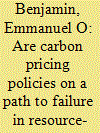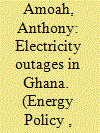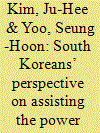|
|
|
Sort Order |
|
|
|
Items / Page
|
|
|
|
|
|
|
| Srl | Item |
| 1 |
ID:
094859


|
|
|
|
|
| Publication |
2010.
|
| Summary/Abstract |
This study applies a threshold model proposed by to analyze the diffusion process of donating behavior for renewable energy. We first use a stated preference survey to estimate the determinants of a decision to support the donation scheme under various predicted participation rates. Using the estimated coefficients, we simulate how herd behavior spreads and the participation rate reaches the equilibrium. The participation rate at the equilibrium is estimated as 37.88% when the suggested donation is 500 yen, while it is 17.76% when the suggested amount is 1000 yen. The influence of environmentalism and altruism is also examined, and we find that these motivations increase the participation rate by 31.51% on average.
|
|
|
|
|
|
|
|
|
|
|
|
|
|
|
|
| 2 |
ID:
183562


|
|
|
|
|
| Summary/Abstract |
There are limited studies on specific factors that affect willingness-to-pay (WTP) and public concerns on spending of pollution pricing in democratic economies that are carbon dependent. In light of the discourse on global pollution pricing, this study explores the complex influence of political-economic, attitudinal, and socio-demographic factors on carbon pricing, by estimating the WTP in a carbon resource-dependent economy such as Canada and the preferred revenue earmarking of Canadians. An online survey of 600 Canadian households was conducted using the random device engagement (RDE) approach. This study uses a contingent valuation method (CVM) and payment card (P.C.) to estimate the household WTP for carbon pricing on direct energy expenditure and an ordered logistic regression model for odds ratio estimates. The estimated annual WTP ranges between CAD$ 84 to CAD$ 230 in 2019 (CAD$ 1 = US$ 0.7538). This implies an acceptable increment of 1.5%–2.5% (CAD$ 157 to CAD$ 259) to the average yearly household energy expenditures. This study suggests that Canadians appear to be supportive of redistributing carbon price revenues and investing in clean energy technology. Canadian government needs to address public concerns surrounding political-economic factors, specifically the energy cost implication for vulnerable households in order to achieve emission reduction targets.
|
|
|
|
|
|
|
|
|
|
|
|
|
|
|
|
| 3 |
ID:
169850


|
|
|
|
|
| Summary/Abstract |
Nuclear energy represents an essential component of the energy mix in the United Kingdom (UK). While most of the existing nuclear plants are scheduled to be decommissioned, new reactors are in the process of being built. Looking ahead, IV generation nuclear energy technology, that aims to minimize some of the hazards of current technologies, is under research and development (R&D). This paper investigates social acceptance of IV generation nuclear energy, examining both willingness to accept (WTA) new nuclear power plants and willingness to pay (WTP) for further research of IV generation technology. Choice experiments (CE) were employed to assess WTA, while contingent valuation (CV) was used to unveil WTP. Results revealed the presence of four segments of respondents: moderate supporters, strong opposers, and two groups of moderate opposers of new nuclear power plants. Interestingly, even amongst strong opposers there are individuals willing to pay for R&D of IV generation technology. Policies aimed at fostering trust – if deserved – towards nuclear energy corporations and authorities, as well as showing tangible progress of R&D to raise confidence among the public are key to foster acceptance of this nuclear energy technology.
|
|
|
|
|
|
|
|
|
|
|
|
|
|
|
|
| 4 |
ID:
169877


|
|
|
|
|
| Summary/Abstract |
African countries experience persistent and serious energy outages, but while multiple valuation studies provide estimates of the costs of electricity outages in high-income countries, evidence is scarce for lower- and middle-income countries. The few studies that assess the value of reliable energy supply rely on the contingent valuation method that is under wide scrutiny. This paper aims to provide new estimates of households' willingness to pay to reduce electricity outages for Ghana and contributes to the debate on the validity of contingent valuation results for energy reliability. Our results suggest that households are willing to pay GHS 67 ($17) per month for reliable electricity supply, equivalent to 7% of respondents’ income. The results of tests for hypothetical bias, WTP-WTA disparity and income effects suggest that the contingent valuation estimates from this study are robust and can support decision makers in prioritizing energy policies and investments.
|
|
|
|
|
|
|
|
|
|
|
|
|
|
|
|
| 5 |
ID:
192724


|
|
|
|
|
| Summary/Abstract |
Reliable electricity is a key factor in improving the living conditions of households and sustainable development of countries. Developing country governments and international organizations address the question of how to obtain a reliable supply of electricity and thus eliminate power outages at the top of their political agendas. In this framework, the aim of this paper is to estimate the willingness to pay of Indian urban consumers for having a continuous supply of electricity, avoiding unexpected power outages, using contingent valuation method. Two different econometric approaches are used. The households in the survey have been asked to state their willingness to pay for five different types of outages. Empirical data from 1043 Indian households has been analyzed using double hurdle approach. The econometric results indicate that, among the investigated households with an average individual annual income around $1630,00, their willingness to pay to avoid power outage strictly depend on the length of outages ranging, on average, from $0.37 (2 h) $3.00 (12 h), that is, households prefer to reduce the duration of outages. Further, income and environmental attitude of respondents positively influence higher WTP to avoid power outages. Our findings provide useful insights for policy makers to design and promote more reliable and customer centric energy generation and distribution models.
|
|
|
|
|
|
|
|
|
|
|
|
|
|
|
|
| 6 |
ID:
117344


|
|
|
|
|
| Publication |
2013.
|
| Summary/Abstract |
We estimate Arizona residents' Willingness to Pay (WTP) to invest in a solar energy research and development fund using data obtained from a Dichotomous-Choice Contingent Valuation mail survey. We examine differences in WTP estimates using different categorizations for respondent uncertainty. We also employ both commonly used Maximum Likelihood and less frequently applied Bayesian estimation techniques. We find that respondent uncertainty has an economically significant impact on WTP estimates, while WTP estimates are robust to different estimation techniques. Our robust specification with strict uncertainty coding indicates the average Arizona household is WTP approximately $17 per month to invest in research and development in solar energy.
|
|
|
|
|
|
|
|
|
|
|
|
|
|
|
|
| 7 |
ID:
150675


|
|
|
|
|
| Summary/Abstract |
The importance of renewable energy as a response to climate change is universally acknowledged. However, its successful implementation requires public approval and cooperation. This study aims to identify the level of renewable energy acceptance in Korea by estimating Korean consumers’ additional willingness to pay (WTP) using the contingent valuation (CV) method, which is the most widely used to analyze consumer preferences. The estimation results indicate that Korean consumers are willing to pay an additional USD 3.21 per month for electricity generated with renewable energy. However, WTP in Korea is low relative to other advanced nations, indicating that these values could be influenced through policies aimed at improving knowledge and acceptance of renewable energy sources among Korean consumers.
|
|
|
|
|
|
|
|
|
|
|
|
|
|
|
|
| 8 |
ID:
177404


|
|
|
|
|
| Summary/Abstract |
Using unique household-level data from rural areas of six energy-access-deprived states in India, we examine the willingness-to-pay (WTP) for exclusive use of liquefied petroleum gas (LPG) for cooking. We find that awareness about LPG's health benefits and diffusion of LPG within the community are the strongest determinants of WTP for exclusive use of LPG. Among demographic characteristics, only household size is correlated with WTP. Importantly, households exhibit significant price elasticity with regards to exclusive use of LPG. Households with irregular cash flows are less likely to pay for exclusive use of LPG. We find limited evidence supporting a negative association between availability of free biomass and the WTP for exclusive use of LPG. In contrast, higher household expenditure on purchased biomass is positively associated with WTP. Our estimates of mean WTP suggest that they are higher than the current effective monthly cost of subsidized LPG across households. However, they mask variation, and disaggregated estimates suggest that about 40–45 per cent of the households not using LPG as their primary fuel have a lower WTP than the current effective monthly cost of subsidized LPG and hence would need additional support to enable their cooking energy transition.
|
|
|
|
|
|
|
|
|
|
|
|
|
|
|
|
| 9 |
ID:
132790


|
|
|
|
|
| Publication |
2014.
|
| Summary/Abstract |
This paper explores people×s preferences for a Built in Photovoltaic (BIPV) renewable energy system to be integrated into housing construction. A novel methodology was developed, to study the case of Northern Cyprus, for better understanding of possibilities that abound in BIPV integration. The methodology incorporates Building Information Modeling (BIM) as a real-time design and economic assessment tool for BIPV choices. This serves to benefit both the construction companies and potential house owners in their decision-making. In addition, it uses a Contingent Valuation (CV) method to assess the Willingness to Pay (WTP) and the Willingness to Accept (WTA) compensation. The results indicate that the capital cost of PV is not instrumental in choice, and a lower feed-in tariff could be acceptable.
|
|
|
|
|
|
|
|
|
|
|
|
|
|
|
|
| 10 |
ID:
091581


|
|
|
|
|
| Publication |
2009.
|
| Summary/Abstract |
The main objective of this paper is to measure how much home-site factors can help to explain the individual WTP for an environmental improvement in power generation in Galicia, Spain. The results show that home-site variables such as a dispersed population, local community income, population growth and coastal/inland emplacements have significant effects on the residents' WTP. Individual and home-site models are compared using goodness-of-fit measures, and implications for forestry resources management and energy planning are discussed. The results favor to take into account the home-site variables into the WTP function. Moreover, a different structure of preferences for coastal and inland inhabitants is identified. A cross-validity analysis shows that some home-site coefficients are common to both sub-samples, but the scale parameters are not homogenous. This analysis could be useful to inform and support the public energy policy when designing incentives that promote the electric use of biomass.
|
|
|
|
|
|
|
|
|
|
|
|
|
|
|
|
| 11 |
ID:
150783


|
|
|
|
|
| Summary/Abstract |
The Korean governmental support for supply security of oil and gas via overseas exploration and production (E&P) projects are publicly criticized because of some poor projects lacking of economic feasibility, even though it should be expanded from a long-term perspective. Applying the contingent valuation, this study investigates the Korean public's preferences for governmental support for overseas oil and gas E&P projects. The result shows that the governmental support for overseas E&P projects rather decreases public utility. The primary reason behind this utility decrease is that some respondents protested to bid because of their resistance toward tax increase without guaranteeing the efficient government support. This result implies that simple tax increases for expansion of the governmental support may bring about public's strong opposition. In order to overcome this public opposition, this study suggests that it is necessary to arouse public understanding of the necessity of overseas oil and gas E&P projects.
|
|
|
|
|
|
|
|
|
|
|
|
|
|
|
|
| 12 |
ID:
169746


|
|
|
|
|
| Summary/Abstract |
This study estimates the public willingness to pay (WTP) for the research and development of solar energy in Beijing using a contingent valuation method (CVM). To this end, this study reports the results from a CVM survey of 760 respondents. The results show that Beijing residents are willing to pay an additional CNY5.85 (USD0.86) per household per month, on average, for the research and development of solar energy in Beijing. Respondents’ educational attainment, household income, risk attitudes, and attitudinal beliefs about energy problems have significant and positive influences on their willingness-to-pay decisions, while bid values have a significantly negative effect on their willingness-to-pay decisions. The annual total WTP for the research and development of solar energy in Beijing was estimated at CNY23.78 million (USD3.71 million). Our results can provide useful and important insights for energy regulators, helping them to adjust renewable energy policies and promote the utilization of solar energy.
|
|
|
|
|
|
|
|
|
|
|
|
|
|
|
|
| 13 |
ID:
119821


|
|
|
|
|
| Publication |
2013.
|
| Summary/Abstract |
The massive deployment of renewable energy sources represents a high priority for Greece in order to comply with the Directive 2009/28/EC on the promotion of the use of energy from renewable sources by 2020. In this perspective, Aegean islands especially Lesvos, are endowed with a considerable potential of a portfolio of renewables, a fact that the entrepreneurial interest has already been targeted. However, regulatory attempts for a massive penetration of renewables do not take seriously into account preferences and risk perceptions of local communities where the proposed projects are to be installed. The aim of this study is to investigate individual preferences and social values towards specific technologies of renewables in Lesvos island. We apply an open-ended contingent valuation survey in order to analyze factors shaping public attitudes towards a portfolio of renewable technologies and estimate the economic welfare (Willingness To Pay) of the preferred technologies. We argue that such information is relevant for energy policy design and the establishment of effective measures for the promotion of renewable energy sources.
|
|
|
|
|
|
|
|
|
|
|
|
|
|
|
|
| 14 |
ID:
176691


|
|
|
|
|
| Summary/Abstract |
Korea is the only divided country in the world. While power is stably and reliably supplied in South Korea, North Korea (NK) is suffering from a severe power shortage. To improve power supply conditions in NK and ultimately contribute to building peace on the Korean Peninsula, the South Korean Government is considering assisting the construction of power plants and power grids in NK. The Government needs information about households’ willingness to pay (WTP) for assisting the power supply to NK. This article aims to examine the WTP using a contingent valuation based on a nationwide survey of 1000 households. As a WTP elicitation method, the one-and-one-half-bounded question format of asking an interviewee whether she/he has the intention of paying a presented bid through an increase in electricity bills was adopted. The WTP for the assistance was statistically significantly estimated to be KRW 2382 (USD 2.12) per month per household. The estimate of the annual national value amounted to KRW 564.6 billion (USD 503.6 million). This value is by no means small, but it would take a huge amount of effort to elicit public consensus on the assistance considering that a significant proportion of respondents (63.6%) revealed zero WTP.
|
|
|
|
|
|
|
|
|
|
|
|
|
|
|
|
| 15 |
ID:
143363


|
|
|
|
|
| Summary/Abstract |
We examine how transboundary river pollution affects WTP for a river improvement project. The survey conducted in 20 cities of the Xijiang River basin demonstrates that downstream city report lower WTP when its upstream is more polluted. This negative externality decreases with distance and relative bargaining power of downstream city. The simulated gain in social benefit from an integrated river basin management, which reduces people's concerns about this externality, is significant. Such gain can also be regarded as upper bound for transfer from downstream to upstream in the “Ecological Service Payment” regime, a market-based environmental policy under pilot in China.
|
|
|
|
|
|
|
|
|
|
|
|
|
|
|
|
| 16 |
ID:
103616


|
|
|
|
|
| Publication |
2011.
|
| Summary/Abstract |
This paper explores Turkish urban households' willingness to pay (WTP) for CO2 emission reductions expected to result from improvements in power production. A face-to-face questionnaire, with a Contingent valuation (CV) module prepared using the double-bounded dichotomous choice elicitation framework, was administered to 2422 respondents representative of urban Turkey-a developing country with low but rapidly increasing greenhouse gas emissions. The determinants of WTP were identified by considering not only the impact of standard socio-economic factors but also the effects of environmental knowledge, attitudes and behaviour, the relevance of the identity of the collection agent (national versus international institutions) in terms of trust people have towards them, and the degree of perceived participation of others in the realization of the project. Our study confirms the existing literature in demonstrating that WTP figures reported by young and educated people that are active on environmental issues, and who also possess material security and environmental knowledge, are more likely to be high. However, their willingness to make contributions is hampered significantly by their belief that their fellow citizens will not contribute and the general lack of trust in institutions. Overall, this study may be taken as a call to eliminate governance-related uncertainties in climate change deals.
|
|
|
|
|
|
|
|
|
|
|
|
|
|
|
|
| 17 |
ID:
166310


|
|
|
|
|
| Summary/Abstract |
This article examines Korean consumer responses towards second-generation lignocellulosic bioethanol. Consumer surveys were conducted in the Korean cities of Seoul, Incheon, Bucheon, Gwangju, Seongnam and Suwon with three information treatments for the purpose of this study. The survey collected data on consumers’ willingness to pay (WTP) for this product, their driving patterns, knowledge about renewable energy, acceptance of relevant government policies, and demographic characteristics. A dichotomous-choice contingent valuation methodology is used to estimate WTP for this product and investigate factors that affect consumer choice. The findings include that the average respondent in the sample is willing to pay a 4.3% premium over second-generation bioethanol compared to conventional fuel. The mean premium is highest (6% premium) for respondents who received information about positive environmental effects of the advanced fuel. Being female and higher income positively affect WTP. Also higher self-reported knowledge about renewable energy sources and higher valuation of environmental friendliness positively affect WTP for advanced bioethanol.
|
|
|
|
|
|
|
|
|
|
|
|
|
|
|
|
| 18 |
ID:
181435


|
|
|
|
|
| Summary/Abstract |
Despite the potential benefits to human health and greenhouse gas mitigation, the uptake of biogas plants in Nepal and other developing countries has been less than optimal. We investigate the potential to stimulate the market for biogas plants through the distribution of environmental income generated from carbon credits. While previously identified in the literature, this has received limited experimental testing in the context of rural households in developing countries. We first use contingent valuation to assess willingness to pay for domestic biogas plants. Using Heckman selection models, we then examine how the provision of carbon revenue earnings influences household willingness to purchase in the absence of a subsidy. We find that households are willing to pay on average US $361.54 for a biogas digester, which is less than full market price of US $433.79, but higher than the current market price net of government subsidy. Household willingness to purchase is influenced by access to environmental income for those not initially in the market, but has no effect on those initially willing to purchase a biogas plant. Our findings suggest that the provision of environmental income has the potential to lead to more rapid and widespread adoption of biogas plants.
|
|
|
|
|
|
|
|
|
|
|
|
|
|
|
|
| 19 |
ID:
092799


|
|
|
|
|
| Publication |
2009.
|
| Summary/Abstract |
Green electricity is energy that is generated from renewable energy sources such as solar power, wind power, small-scale hydroelectric power, tidal power, and biomass power. These sources mostly do not produce pollutants and are considered environmentally friendly. However, considering the current state of technology, they are more costly. Government should take visible actions to compensate for the increased production costs. This paper attempts to apply a contingent valuation (CV) method to obtain at least a preliminary evaluation of the benefits that ensue from the introduction of the policy that raises the percentage of green electricity consumption from 0.2% of the total electricity supply to 7% by 2011. Overall, the CV survey was successful in eliciting the willingness to pay (WTP) for green electricity considering that the CV method operated within respondents' abilities to answer and the WTP estimates were statistically significant. The monthly mean WTP estimates from parametric and non-parametric methods were KRW 1681 (USD 1.8) and KRW 2072 (USD 2.2), respectively. The estimates of the annual benefits to relevant residents amounted to KRW 150.5 billion (USD 157.5 million) and KRW 185.6 billion (USD 194.2 million), respectively.
|
|
|
|
|
|
|
|
|
|
|
|
|
|
|
|
| 20 |
ID:
179707


|
|
|
|
|
| Summary/Abstract |
South Korea tried to drastically expand the capacity of wind power generation from 1.8 GW in 2020 to 24.9 GW in 2034. Moreover, the “Green New Deal” policy is being implemented to promote employment and growth by using domestic wind power facilities. This article estimates additional willingness to pay (WTP) or price premium, for electricity generated from domestic wind power facilities over that from imported ones. For this purpose, a contingent valuation survey of 1000 households was carried out employing the closed-ended question during September 2020. A spike model is utilized to reflect the zero WTP values reported by 58.3% of the interviewees. Several factors affecting the price premium were also analyzed to derive implications. The average price premium for electricity generated from domestic wind power generation facilities was estimated to be KRW 22.5 (USD 0.019) per kWh with statistical significance. This value reaches 21.4% of the electricity price for 2019 (KRW105 or USD 0.089 per kWh). It should be noted that more than half of the people reported a zero price premium, as they thought that “Green” is more important than “New Deal,” or they worried that the supply of domestic wind power facilities could raise electricity bills.
|
|
|
|
|
|
|
|
|
|
|
|
|
|
|
|
|
|
|
|
|